Reducing interest rates and unsecured loans for private enterprises: Transparency to create trust
According to Mr. Nguyen Van Than, Chairman of the Vietnam Association of Small and Medium Enterprises, for a long time, many banks have focused on lending to large enterprises and are reluctant to lend to small and medium enterprises. In Resolution 68-NQ/TW on private economic development, the Politburo set out the task of removing barriers to access to land, credit, data, high-quality human resources, etc. for private enterprises. This opens up more opportunities for small and medium enterprises to access capital.
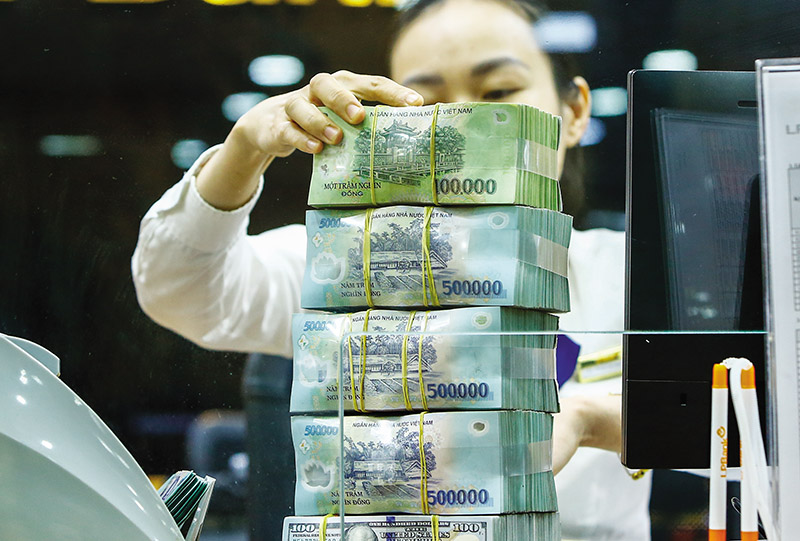 |
Private enterprises are the target customers of commercial banks. Deputy Governor of the State Bank of Vietnam (SBV), Mr. Dao Minh Tu, said that outstanding credit loans to private enterprises by the end of 2024 will reach about 7 million billion VND, an increase of 14.7% compared to 2023, accounting for 44% of the total outstanding loans of the whole economy .
Of which, 100 credit institutions have outstanding loans to small and medium enterprises, with a total outstanding loan balance of VND 2.74 million billion, an increase of 10.7% compared to the end of 2023, accounting for 17.6% of the total outstanding loan balance of the whole economy. Currently, there are 208,992 small and medium enterprises, almost all of which are private, with outstanding bank loans.
“For small and medium enterprises, the State Bank has identified them as priority subjects for lending with preferential interest rates, as short-term lending interest rates in VND are lower than those for normal production and business sectors, currently 4%/year,” said Deputy Governor Dao Minh Tu.
Ms. Phung Thi Binh, Deputy General Director of Agribank, commented that the contribution of the private economy is very large to the economy. For Agribank, the total outstanding debt is currently more than 1.7 million billion VND, of which 65% is for loans to agriculture, rural areas and farmers, most of which are loans to private economic households. In addition, Agribank has nearly 500,000 billion VND in outstanding loans to legal entities, of which 90% are private enterprises.
Although the scale of outstanding credit to the private sector is increasing, in reality, 70% of private enterprises still cannot access bank capital. The biggest barrier is collateral. Enterprises expect that in the near future, the banking sector will have specific policies to implement Resolution 68-NQ/TW, thereby opening up the credit flow to private enterprises.
Resolution 68-NQ/TW sets out the task of reviewing and perfecting credit mechanisms and policies for the private economy. There is a policy of prioritizing a portion of commercial credit sources for private enterprises, especially small and medium enterprises, supporting industry enterprises, innovative startups, loans to invest in machinery, equipment, new technology, green transformation, digital transformation, export credit, and supply chain credit.
Encourage financial and credit institutions to lend based on the assessment of production and business methods, plans to expand output markets, lend based on data, cash flow, value chains, consider collateral including real estate, intangible assets, future assets and unsecured lending.
Promote the development of green credit; The State has a mechanism to support interest rates and encourage credit institutions to reduce interest rates for private enterprises to borrow to implement green, circular projects and apply the environmental, social, and governance (ESG) standards framework.
The spirit of Resolution 68-NQ/TW has made many businesses very excited because it has targeted the biggest problems of businesses today. Regarding the issue of capital access, according to Mr. Luong Quoc Toan, Deputy General Director of Phu Giang Paper and Packaging Company (Bac Ninh), currently banks only prioritize accepting real estate as collateral, and do not want to accept machinery, equipment, or inventory as collateral. This makes it difficult for businesses to increase credit limits and access capital in a timely manner.
Many businesses also complain that, even though they are half a century old, have exported goods to dozens of countries around the world, and are trusted by customers, banks still do not dare to give unsecured loans.
However, from the banking perspective, they also have their own difficulties. The deputy general director of a large commercial bank said that when lending, banks must follow strict procedures to ensure that they do not lose capital. Once bad debt occurs, there is a possibility of losing capital, not only affecting the bank's profits, but credit officers are also at risk of being criminally prosecuted.
“Not to mention, the situation where a business has two financial reports - one profit report to prepare bank loan application and one loss report to send to tax authorities - has become common. With this situation, it is very difficult for banks to trust and lend mortgage loans. If data is linked with the tax sector and the business's real financial reports are accessed, unsecured lending will no longer be so difficult,” said the Deputy General Director.
Mr. Nguyen Van Than admitted that banks are also businesses, and businesses must make a profit and ensure capital safety. Therefore, in order for banks to feel secure in lending, businesses must be truly transparent and must demonstrate to banks their development potential.
According to experts, the credit leverage ratio in Vietnam is among the highest in the world, posing many risks to banks, businesses and the economy. Therefore, businesses should expand their access to capital and not rely too much on bank credit.
“Sharks” reduce purchases, gold market becomes more unpredictable
The factors driving the gold price increase are still there, but the risks that could cause the gold price to “turn around” are also very high. Experts say that investors should consider gold as a safe haven, rather than an investment channel.
The World Gold Council (WGC) report on gold demand trends in the first quarter of 2025 shows that total quarterly gold demand (including the over-the-counter market - OTC) was 1,206 tons, up 1% year-on-year, in the context of record high gold prices, surpassing the threshold of 3,000 USD/ounce. Thus, global gold demand in the first quarter of 2025 has slowed down compared to the growth rate in the first quarter of 2024 (up 3%).
 |
In particular, the central bank sector - the driving force behind gold price growth in recent years - continued to be net buyers, but their gold demand in the first quarter of 2025 decreased by 21% compared to the same period last year.
Domestically, gold demand in the first quarter of 2025 increased by 46% compared to the fourth quarter of 2024, but decreased by 15% compared to the same period, partly due to scarce supply, partly because in the first quarter of 2024, gold demand in Vietnam was the highest in 10 years.
Dr. Nguyen Tri Hieu, an economic expert, warned that investors need to be cautious with gold at this time, because there is not much room for price increases and it is in a situation where it can turn around at any time. Furthermore, the difference between domestic and international gold prices has reached VND18 million/tael, meaning investors will have to bear a lot of risks if the world gold price adjusts.
In recent weeks, the gold price increase has also slowed down. In the first quarter of 2025, the driving force for global gold demand growth was the sharp increase in inflows into gold exchange-traded funds (ETFs). Total investment demand from gold ETFs by the end of the first quarter of 2025 increased to 552 tons, up 170% year-on-year and reaching the highest level since the first quarter of 2022. However, inflows into ETFs often rotate very quickly and at any time.
Regarding the gold market trend in the coming time, Ms. Louise Street, senior market analyst at WGC, said that the overall economic picture is still difficult to predict. That uncertainty can push up gold prices, investors continue to seek gold as a safe storage asset from organizations and individuals.
However, as the 90-day reprieve from the reciprocal tax is getting shorter, many analysts are warning investors to be cautious of the risk that gold prices could “turn around” if trade risks ease and the trade war eases. If this happens, it is very likely that world gold will return to the $3,000/ounce price range.
As of early this week, the difference between domestic and international gold prices has reached VND19 million/tael, the highest level ever, even higher than the time before the State Bank of Vietnam (SBV) intervened in the gold market. In a report recently sent to the National Assembly, the Governor of SBV admitted that the difference in gold prices has increased sharply again since early April 2025 due to three main reasons.
Firstly, the expectation that world gold prices will continue to increase in the context of the tariff policies of the US President Donald Trump Administration expected to have a negative impact on the global economy; the unpredictable monetary policy roadmap of the US Federal Reserve (Fed); tense global geopolitical developments; and possible commodity price shocks that may arise, causing increased demand for gold.
Second, the supply of gold bars in the market has not increased since the beginning of 2025, the foreign exchange market and the gold market are relatively stable, so since the beginning of 2025, the State Bank has not had to intervene in the market.
In addition to the above reasons, a third reason cannot be ruled out: some businesses and individuals take advantage of market fluctuations to speculate, inflate prices, and profit.
However, the State Bank believes that the current developments in the gold market have not yet affected monetary policy management.
In fact, when exchange rates and interest rates are under pressure as they are now, the possibility of the State Bank sacrificing foreign currency to increase supply for the gold market is unlikely, because gold is not an essential commodity.
In the context of the gold market facing many risks and the possibility of the State Bank of Vietnam intervening in the market is very low, Mr. Phan Dung Khanh, a financial expert, recommends that investors should consider gold as a safe haven, instead of an investment channel. The factors supporting gold price increases are weakening and certainly cannot maintain the rapid increase as in the past. In the immediate future, gold prices will remain high because the world economy is still in a period of instability. However, at this stage, investors should only consider gold as a storage channel, if they speculate, it will be very dangerous.
Banks Confused With Digital Assets, Cryptocurrencies
Many businesses “indicate” that banks accept digital assets (cryptocurrency, software, etc.) as collateral. However, not only is there no legal framework, but the risks are too great, making banks hesitant.
Mr. Nguyen Kim Hung, Chairman of the Board of Directors of Kim Nam Group, said that many businesses own software products with great commercial value, but they are not valued by banks and are not considered as collateral. Many businesses want to issue tokens to raise global capital, but cannot do so due to legal obstacles. Meanwhile, in the world, the digital technology race is accelerating.
“We hope that the relevant authorities will study and consider issuing regulations on identifying digital assets and methods for valuing digital assets for businesses so that they can access capital sources from commercial banks and invest in the short, medium and long term. If we can resolve this, the flow of money from banks to the small and medium-sized enterprise community will be better,” Mr. Hung suggested.
According to experts, the Draft Law on Digital Technology Industry has initially established the concept of digital assets and ownership of these assets. “This is an important step that paves the way for the establishment and secured transactions of digital assets in the future,” emphasized Dr. Le Thi Giang, Hanoi Law University.
Experts say that Vietnam should consider issuing a separate law or decree on digital assets, clearly defining the responsibilities of related parties such as issuers, exchanges, investors and requiring operating licenses. On the other hand, it should strengthen supervision against money laundering and terrorist financing, requiring exchanges to register with the regulatory agency.
In the immediate future, it is possible to issue a sandbox regulation allowing some banks or financial institutions to pilot mortgage loans using digital assets for 3-5 years; evaluate the pilot results to adjust the legal framework, ensuring a balance between innovation and risk control; prioritize highly liquid digital assets during the testing phase; consider establishing a specialized agency to monitor the digital asset market, ensuring compliance with regulations on capital, risk management and anti-money laundering, etc.
Lawyer Truong Thanh Duc, Director of ANVI Law Firm, said that according to regulations, assets can be mortgaged if they meet two conditions: ownership and not being prohibited from trading. Cryptocurrencies that meet these two conditions can, in theory, be used as collateral. However, in reality, no bank dares to accept cryptocurrencies for secured transactions, partly because the State Bank has issued a directive, partly because the risks are too great.
"Accepting collateral is to prevent risks, but the collateral itself is too risky, so it is understandable that banks are afraid," Mr. Duc commented.
According to Mr. Giacomo Merello, Chairman of the Antigua and Barbuda Digital Asset Business Promotion Council, Special Economic Envoy of the Prime Minister of Antigua and Barbuda in Singapore, in the world, some countries have allowed the use of digital assets in general, and cryptocurrencies in particular, as collateral at banks. Specifically, Singapore recognizes stable coins as a type of asset. Switzerland allows banks to provide loans guaranteed by cryptocurrencies, but this service is mainly provided to investment funds and large enterprises, not to small individuals.
Mr. Giacomo Merello admitted that in many countries, accepting cryptocurrencies as collateral is only implemented in digital banks (mostly small and medium-sized banks) and only applies to large customers. Meanwhile, large and long-standing commercial banks are still very conservative, hardly accepting cryptocurrencies as collateral. The ability of Vietnamese banks to accept digital assets as collateral, or even participate in this field, is very limited.
Recently, responding to shareholders about participating in establishing a digital asset trading floor (the draft is being developed by the Ministry of Finance), BIDV leaders said that, as a domestic commercial bank, BIDV will actively participate with ministries and branches to implement. However, establishing a BIDV digital asset trading floor will be "reserved" for the private enterprise sector.
“BIDV has no plans to establish a company to deploy this platform, as this requires a large amount of capital, not to mention technology and other factors. However, BIDV will participate in the market as a bank serving payment and related operations,” BIDV leaders affirmed.
Banks’ caution with digital assets, especially cryptocurrencies, is understandable. However, according to experts, in the context of strong growth in digital assets, a legal framework is still needed on this issue. Of course, whether to accept or not will depend on each bank’s risk appetite.
According to lawyer Vu Van Tinh, Director of Salus Law Firm LLC, it is necessary to add a definition of digital assets to the Civil Code. At the same time, it is necessary to issue a separate law or decree on digital assets, and issue a sandbox mechanism allowing some banks or financial institutions to pilot mortgage loans using digital assets for 3-5 years.
Interest rates will be under pressure as deposits are competing with stocks and real estate.
The State Bank said that interest rates will face a lot of pressure in the coming time, partly due to increased capital demand in capital mobilization and competition from other investment channels such as real estate and the stock market.
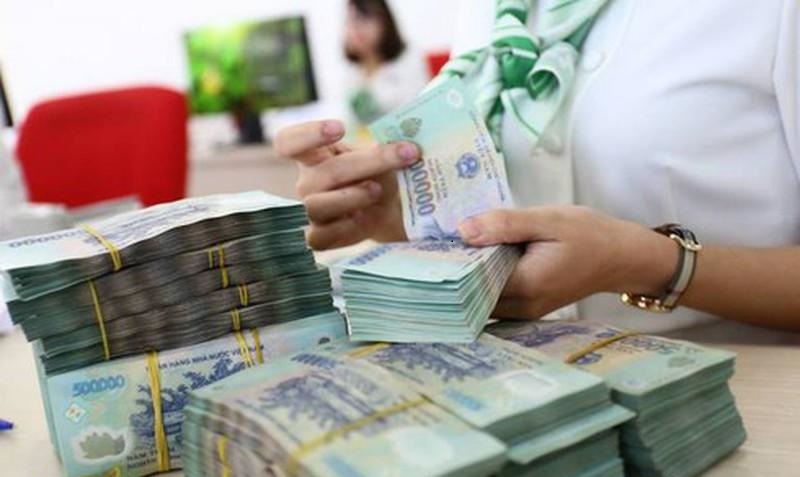 |
In a report recently sent to the National Assembly on the implementation of the National Assembly's Resolution on interpellation, the Governor of the State Bank said that over the past time, the State Bank has continued to maintain low operating interest rates to guide the market to reduce lending interest rates to support businesses and people, while continuing to direct credit institutions to reduce operating costs, increase the application of information technology, digital transformation and other solutions to strive to reduce lending interest rates. The State Bank has also worked directly and issued an official dispatch directing the entire system of credit institutions to stabilize deposit interest rates and reduce lending interest rates to contribute to promoting economic development.
By April 10, 2025, the average lending interest rate for new transactions of commercial banks will be 6.34%/year, down 0.6%/year compared to the end of 2024.
In particular, the exchange rate and foreign exchange market have recently been under great pressure, multi-dimensional and rapidly changing due to unpredictable international economic and political developments, especially the US government's tariff policy, and the rapid fluctuations of the international USD, putting pressure on currencies.
In that context, the State Bank flexibly manages exchange rates, coordinates monetary policy tools (regulating liquidity, interest rates) and intervenes when necessary to stabilize the foreign exchange market, contributing to stabilizing the macro economy and controlling inflation. As a result, the foreign exchange market remains stable, foreign exchange liquidity is smooth, the legitimate foreign currency needs of the economy are fully and promptly met; the VND exchange rate increases/decreases in both directions, in line with the general trend of international currencies compared to the USD.
As of April 22, 2025, the VND/USD exchange rate is trading around 25,896 VND/USD, an increase of 1.64% compared to the end of 2024.
Although monetary policy has been stable in recent times, the State Bank said many challenges lie ahead.
Inflation has potential to increase in the context of the large openness of Vietnam's economy, fluctuations in world commodity prices due to the impact of complex geopolitical developments, increasing trends in trade protectionism, food security in countries, roadmap for adjusting prices of state-managed goods and services, climate change and extreme weather events, etc.
Interest rates will be under pressure in the coming time due to a number of reasons: Lending interest rates have tended to decrease sharply in recent times; Demand for credit capital for production, business and consumption is expected to increase strongly in the coming time to meet the economic growth target in 2025, while capital mobilization of the entire credit institution system may be affected and compete with other investment channels (such as real estate, stock market); World interest rates tend to decrease but remain high and the global financial market is unpredictable after the US announced its reciprocal tax policy.
The State Bank also assessed that the exchange rate and foreign exchange market in the coming time are likely to continue to be under great pressure from complex factors in the international market (the Trump Administration's tariff policies are expected to have a negative impact on the global economy; the unpredictable monetary policy roadmap of the US Federal Reserve (Fed); geopolitical developments, commodity price shocks, etc.) and domestic difficulties (the difference in VND and USD interest rates, the economy's demand for foreign currency remains high, etc.).
Cross-ownership control is still difficult due to "standing in the name of others", many SOEs have not yet divested from banks
There is still a situation of excessive ownership of shares in commercial banks which are state-owned enterprises with a fairly large ownership ratio, and commercial banks have difficulty in requiring these shareholders to divest capital.
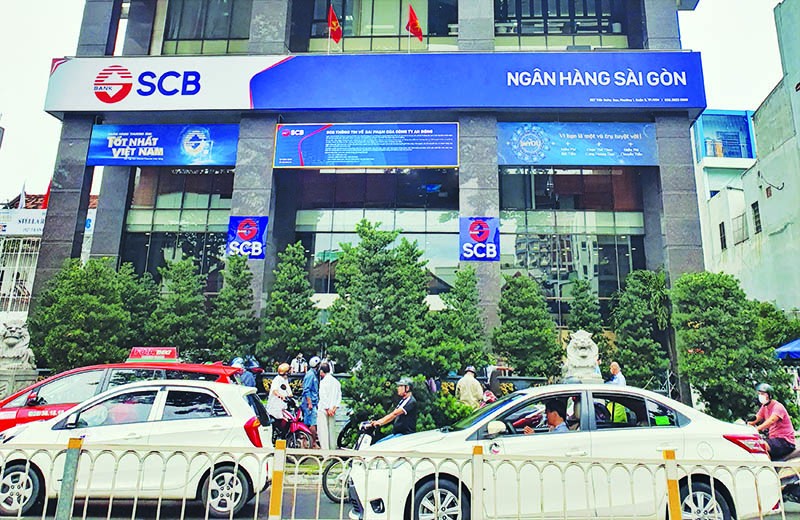 |
In a report recently sent to the National Assembly on the implementation of the National Assembly's Resolution on questioning, the Governor of the State Bank said that in recent years, the State Bank has continued to improve the legal basis and resolutely implemented solutions to prevent and handle share ownership exceeding the prescribed limit, cross-ownership, lending, and investment in violation of regulations, along with the process of restructuring credit institutions.
Specifically, the Law on Credit Institutions 2024 has added regulations to help prevent cross-investment, cross-ownership, and ownership of manipulative and dominant nature in credit institutions.
The State Bank also continues to direct the prevention and handling of share ownership exceeding the prescribed limit, cross-ownership, lending, and investment in violation of regulations. Accordingly, share ownership exceeding the prescribed limit, cross-ownership in the credit institution system has been gradually handled, and the situation of large shareholders/shareholder groups manipulating and dominating banks has been limited.
Up to now, cross-ownership between credit institutions and related persons of credit institutions contributing capital and purchasing shares at other credit institutions has decreased significantly (overcoming the situation of commercial banks owning shares at another credit institution exceeding the prescribed ratio of over 5% of the voting shares of another credit institution).
Shareholders, shareholders and related parties who own shares exceeding the prescribed limit, mainly in corporations and state-owned enterprises, need to continue to direct and handle in order to focus capital on core business activities and use capital more effectively.
The State Bank said that cross-ownership may involve many entities under the management of ministries/sectors, including the current situation of excess share ownership in commercial banks that are state-owned enterprises with a fairly large ownership ratio, making it difficult for commercial banks to request these shareholders to divest capital.
Regarding the work of detecting, preventing and handling cross-ownership and ownership of manipulative and dominant nature in credit institutions, the Governor admitted to facing many difficulties.
Specifically, cross-ownership control is very difficult in cases where shareholders and related persons of shareholders deliberately conceal or ask other individuals/organizations to stand in their names for the number of shares owned to circumvent the provisions of law on cross-ownership/ownership exceeding the prescribed level or circumvent the provisions on credit limits for related customer groups, the share ownership ratio of shareholders and related persons. This leads to the potential risk of the credit institution's operations lacking transparency and publicity, and at the same time, this can only be detected and identified through investigation and verification by the investigation agency in accordance with the provisions of law.
The detection of relationships between enterprises is still limited because information to determine the ownership relationship of enterprises, especially enterprises that are not public companies, is very difficult. The State Bank cannot proactively look up information as well as determine the accuracy and reliability of information sources; especially in the context of the current rapidly developing stock market and technology.
To detect and prevent cross-ownership, the State Bank said that in the coming time, this agency will continue to monitor the safety of credit institutions' operations and through inspections of capital, share ownership of credit institutions, lending, investment, and capital contribution activities... in case of detecting risks or violations, the State Bank will direct credit institutions to handle existing problems to prevent risks.
At the same time, ministries, departments, and business management units need to pay attention to directing businesses to invest and contribute capital to buy shares at credit institutions in compliance with regulations, use borrowed capital, especially loans from credit institutions for the right purposes, effectively, ensure safety, and repay debts on time to credit institutions.
The State Bank continues to conduct inspections according to the approved Inspection Plan, or conduct surprise inspections (if necessary), focusing on inspecting the contents of share ownership ratio; purchase and sale, transfer of bank shares, credit granting to large customers/customer groups (lending, investing in corporate bonds...) to detect and direct the handling and correction of existing problems and violations in operations, especially violations in credit granting, investment, capital contribution, and share purchase activities of credit institutions.
At the same time, it will review and research to advise on amending and supplementing legal documents if necessary to perfect the legal framework on share ownership as prescribed in the Law on Credit Institutions 2024.
Banks race technology, reduce staff to reduce costs
A series of banks have announced strong investment in technology, applying artificial intelligence (AI) in management and operations, as well as cutting staff to reduce operating costs.
Leaders of many joint stock commercial banks said that the mobilization interest rate level is under a lot of pressure due to the heating up of many other investment channels, while the Government and the State Bank still aim to reduce lending interest rates further to support the economy. In this context, banks are cutting costs to have more room to reduce lending interest rates. However, capital costs - which account for the largest proportion of banks' operating costs - are unlikely to decrease further. Therefore, banks are looking for ways to cut other operating costs, including personnel costs.
“Apart from capital costs, the biggest cost for banks is personnel costs. However, boosting investment in technology is helping banks save on this cost,” said Mr. Nguyen Hung, General Director of TPBank.
It is known that in 2024, TPBank will add 500 robots to automate processes, helping to save time, costs, and human resources. Accordingly, in 2024, the Bank's plan is that the number of employees can reach 8,200 people, but in reality, by the end of 2024, the bank's staff will only be 7,700 people and still complete all growth targets.
In 2025, the Bank will continue to innovate technology, apply AI in operations to innovate processes and streamline the apparatus. It is expected that innovating processes and streamlining the apparatus will help TPBank reduce an additional 300-500 employees, further reducing operating costs and optimizing operations.
At the general meeting of shareholders held on the morning of April 25, Mr. Duong Cong Minh, Chairman of the Board of Directors of Sacombank, also said that the bank is strongly implementing digital transformation, gradually reducing traditional transaction offices and continuing to cut staff.
Previously, VietinBank was the first bank in the group of four state-owned commercial banks to announce that it would cut down on physical transaction points and replace them with digital platform applications.
"In 2025, we will implement many activities related to digital transformation, from investment in infrastructure, hardware, software, to human resources. This is one of VietinBank's biggest priorities," said VietinBank Chairman Tran Minh Binh.
Mr. Binh said that the bank is also testing a customer service center model (contact center) applying AI, which can replace up to 70% of operational staff. In the past 2 years, VietinBank has hardly recruited staff for traditional business activities, including credit and capital. However, in 2025, VietinBank will increase recruitment, especially in the field of information technology, increasing the number of staff in this field from 300 to nearly 1,000 (including outsourcing) with expected very high salaries.
In 2024, nearly 30% of listed banks will cut staff. According to a survey by the State Bank, in the first quarter of 2025, more than 21% of banks will continue to cut staff. According to analysts, the acceleration of digital transformation and restructuring of operations will cause the number of physical transaction offices and bank staff to continue to decrease sharply in the coming time.
For commercial banks, applying technology not only helps cut costs, but also opens up many new business opportunities.
"Previously, digital channels did not bring direct profits to banks, but mainly increased convenience for customers. However, now, combined with e-commerce and digital transformation, digital channels are opening up huge opportunities and potential for banks. The bank that goes first will have a great competitive advantage," said TPBank General Director Nguyen Hung.
It is known that 2 years ago, TPBank invested in information technology systems and deployed lending on digital channels. To date, the bank has 4.5 million customers borrowing capital on digital channels. Profits from lending activities on digital channels have been enough to offset technology investment costs and have begun to contribute well to both fees and interest for the bank.
At VietinBank, Mr. Tran Minh Binh said that the Bank is investing heavily in technology, digital transformation, and platform investment. Currently, up to 60% of the Bank's products are put on digital channels and the number of transactions via digital channels accounts for 99% of the Bank's total transactions.
It can be said that after many years of creating a habit of transacting on digital channels for customers, along with expanding the ecosystem and taking advantage of the power of big data, AI, etc., banks are increasingly proficient in selling products, services and approaching customers on digital channels as well as using these technologies to enhance management capacity.
According to the Vietnam Banking Association, in recent times, banks have applied big data and virtual reality (VR) technology in lending activities to individuals and businesses, helping to connect online payments for many types of fees, taxes and services. In addition, banks are actively applying AI in two main areas, including detecting fraud and money laundering risks; data management and analysis for forecasting and business operations.
This year, many banks announced that they would spend thousands of billions of dong on technology investment to cut costs and improve business efficiency. This shows that the competition for “digital customers” among banks will become increasingly fierce. In this race, banks must compete with each other and prevent increasingly sophisticated fraud and scam risks in the digital environment.
State Bank: Researching digital currency (CBDC), not licensing any Forex floors
The State Bank does not license any Forex floors in Vietnam. Therefore, payment and money transfer abroad for Forex floor transactions are not permitted under current regulations.
In a report recently sent to the National Assembly on the implementation of the National Assembly's Resolution on questioning, the State Bank said that recently, this agency has consulted the experience, researched, and implemented the Digital Currency Project of a number of central banks around the world.
Specifically, the State Bank has participated in seminars, workshops, and training courses to exchange, learn, and discuss with experts from international organizations (such as IMF, BIS, WB, etc.), and participated as an Observer of the CBDC mBridge project of 4 central banks (China, Hong Kong, Thailand, United Arab Emirates) as well as studied documents and published reports of central banks and international organizations on CBDC.
 |
Performing the task of being the Standing Agency of the Working Group for Research and Advice on National Digital Currency, in recent times, the State Bank has proactively researched, coordinated with ministries and branches, developed and reported to the Prime Minister on the implementation of the tasks of the Working Group; and issued a Decision on the Plan for implementing the tasks of the Working Group.
The State Bank has also coordinated with ministries, branches, and agencies to research CBDC and report to the Prime Minister on the implementation of CBDC in other countries. and propose to assign a focal unit to conduct research. Currently, the State Bank continues to follow the instructions of the Deputy Prime Minister, report and coordinate with relevant units to propose related contents.
Regarding the task of strengthening inspection, examination, detection and strict handling of organizations and individuals establishing foreign exchange (Forex) trading floors in violation of the law (Resolution No. 173/2024/QH15), the Governor said that Forex trading floor activities are not within the scope of permitted foreign exchange activities in the field of foreign exchange management, therefore, to date, the State Bank has not licensed any Forex floors in Vietnam.
Payment and remittance abroad (if any) for Forex transactions are not permitted transactions according to current regulations on foreign exchange management.
Illegal Forex trading activities are carried out in cyberspace, so to detect, prevent and handle this activity, it is necessary to have timely coordination and handling by competent authorities such as the Ministry of Culture, Sports and Tourism (performing the information and communication function), the Ministry of Public Security, the Ministry of Industry and Trade, etc.
In recent times, in order to serve the verification and investigation of fraud and property appropriation cases related to the activities of Forex floors in cyberspace, the State Bank has provided information on the current legal framework on foreign exchange management to the Ministry of Public Security and the Investigation Police Agencies of provinces and cities.
At the same time, the State Bank also sent a document to the Ministry of Information and Communications (formerly) requesting measures to manage Forex trading floors in cyberspace. In addition, the State Bank has proactively directed credit institutions to implement measures to prevent and stop the exploitation of illegal transactions, including payments for Forex trading floor operations.
Source: https://baodautu.vn/tien-gui-chiu-suc-ep-boi-chung-khoan-bat-dong-san-ca-map-giam-mua-vang-d281756.html








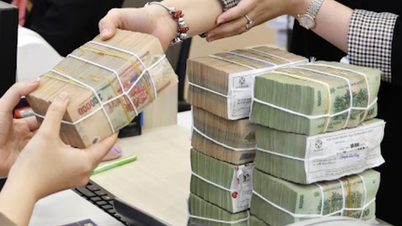

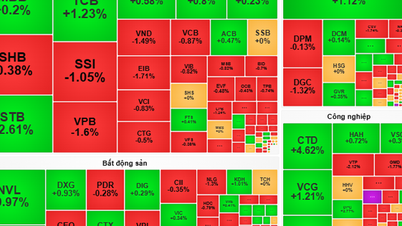
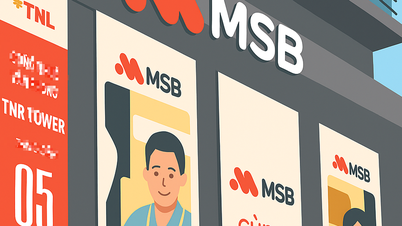

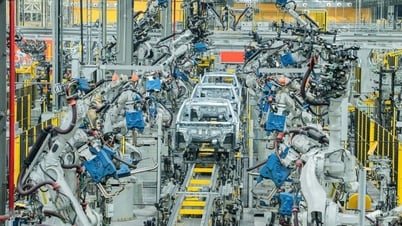









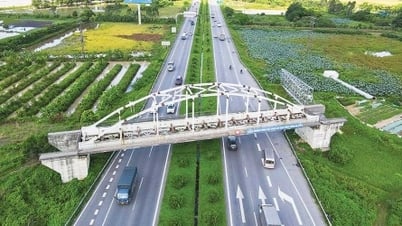



















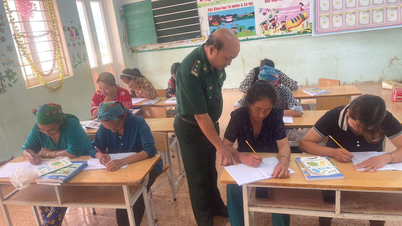










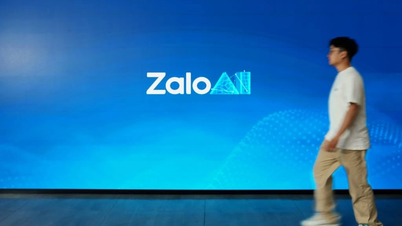



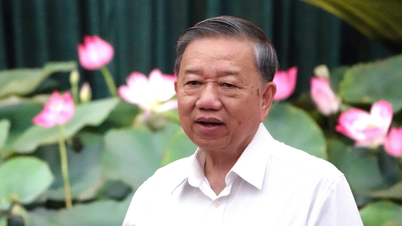



















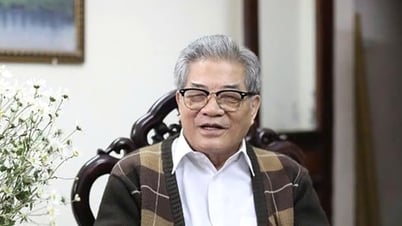

















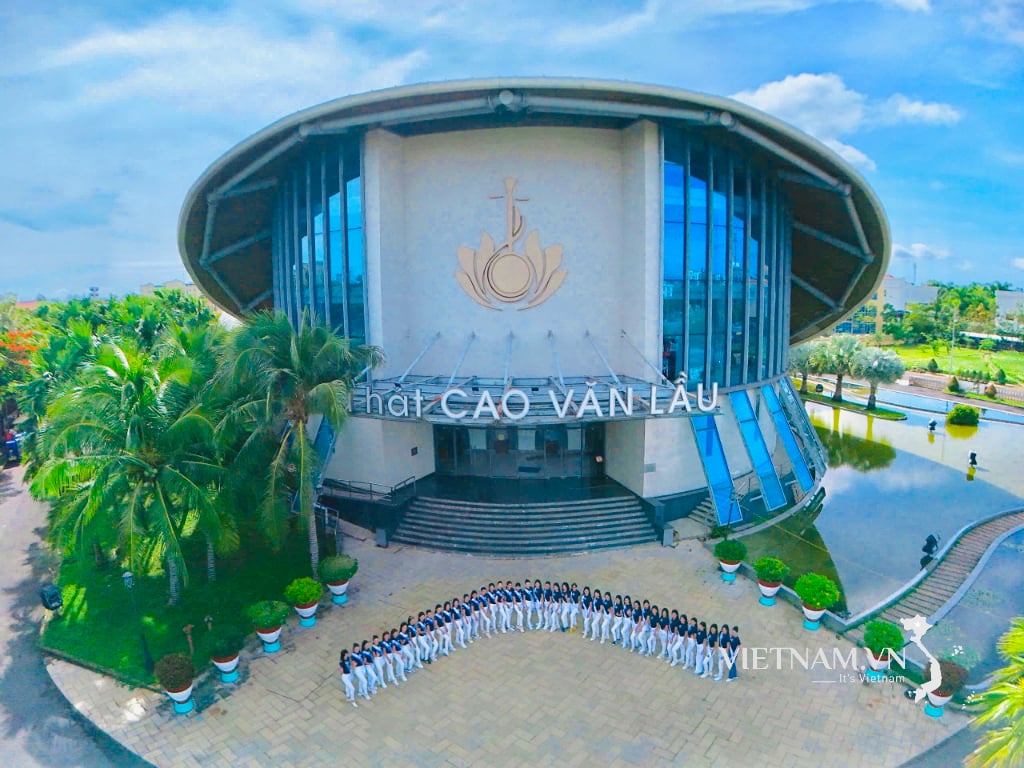



Comment (0)